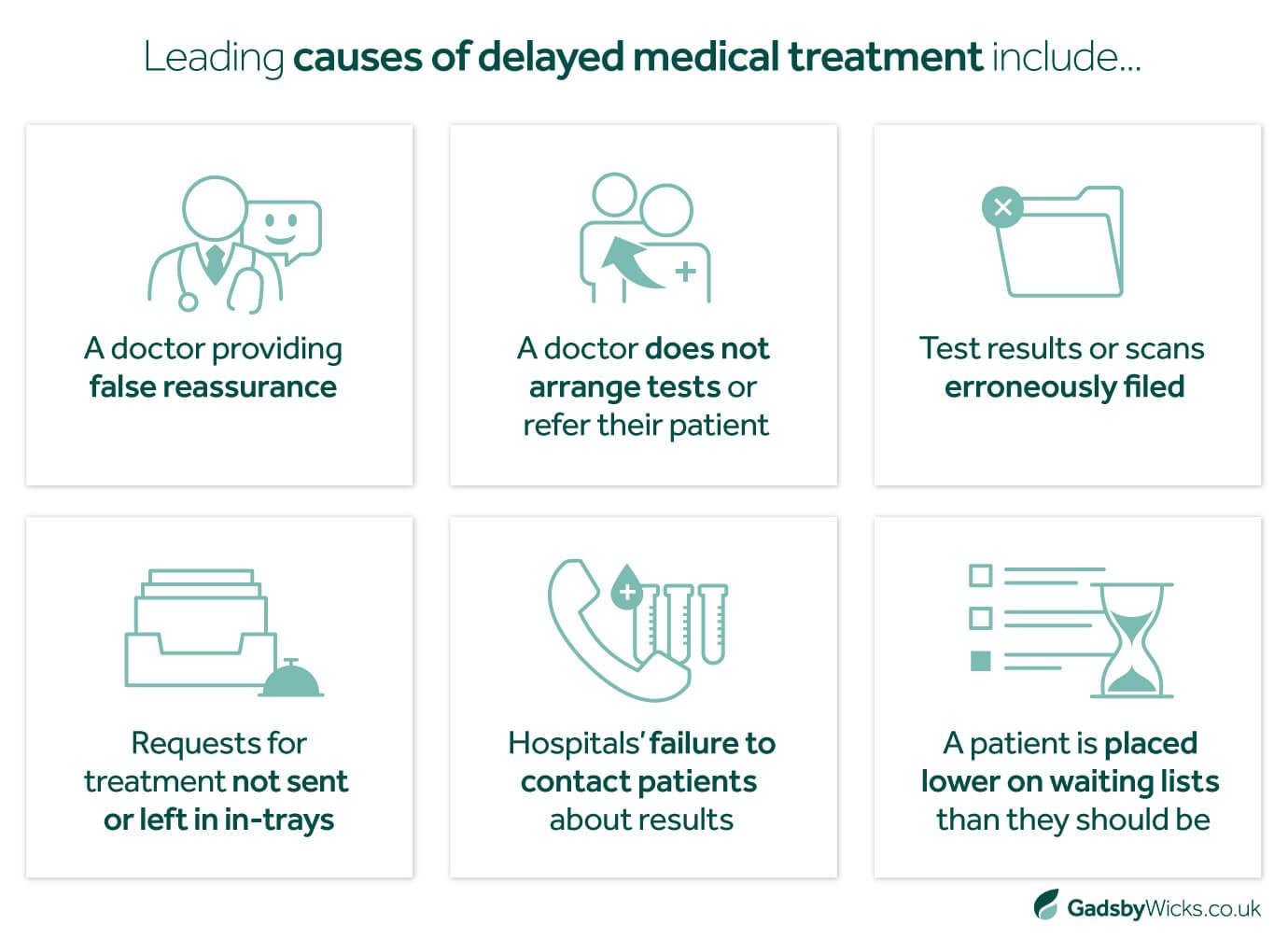- Home >
- Delayed Treatment Claims
We know how devastating significant delays in medical treatment can be – affecting everything from your immediate physical and emotional welfare, to your long-term quality of life.
If your diagnosis or treatment was delayed due to negligence, our experienced solicitors will investigate your claim, find answers and secure your financial future. With a long history of recovering millions in compensation for our clients, trust us to build your case and reach the best possible settlement.

Do you have a delayed treatment claim?
Not all clinical delays are considered negligent. But if you believe avoidable errors caused your treatment to be set back – and this hurt you physically, emotionally or financially – we are here to support your delayed treatment claim.
Whether your delay was due to misplaced test results, poor scheduling or false reassurance from your doctors – our trusted delayed treatment solicitors handle the complexities of litigation, present the strongest case possible, and secure a payout that supports you and your family’s future.

The specialist delayed treatment claims solicitors for Essex & East Anglia
Since 1993, we have represented claims worth hundreds of thousands of pounds for clients affected by delayed treatment across Essex and East Anglia.
Our exclusive experience and expertise in medical negligence cases ensure we review all evidence and get to the bottom of what happened to you. 96% of our cases are resolved out of court, and through our ‘no win, no fee’ approach, you enjoy total peace of mind at every step of your journey.
Delayed Treatment Claims Payouts & Compensation Guide
The compensation awarded for a delayed treatment claim can vary greatly, depending on the nature of the delay, how long it took to receive proper care, and the long-term impact on your health and lifestyle. Every claim is different, and its value reflects the unique consequences of the delay.
At Gadsby Wicks, our expert solicitors in Essex have achieved settlements from £25,000 for minor or temporary harm, to hundreds of thousands of pounds for life-altering injuries. With decades of experience and dedicated client care, we ensure every client secures the justice and financial support they need to rebuild their lives.
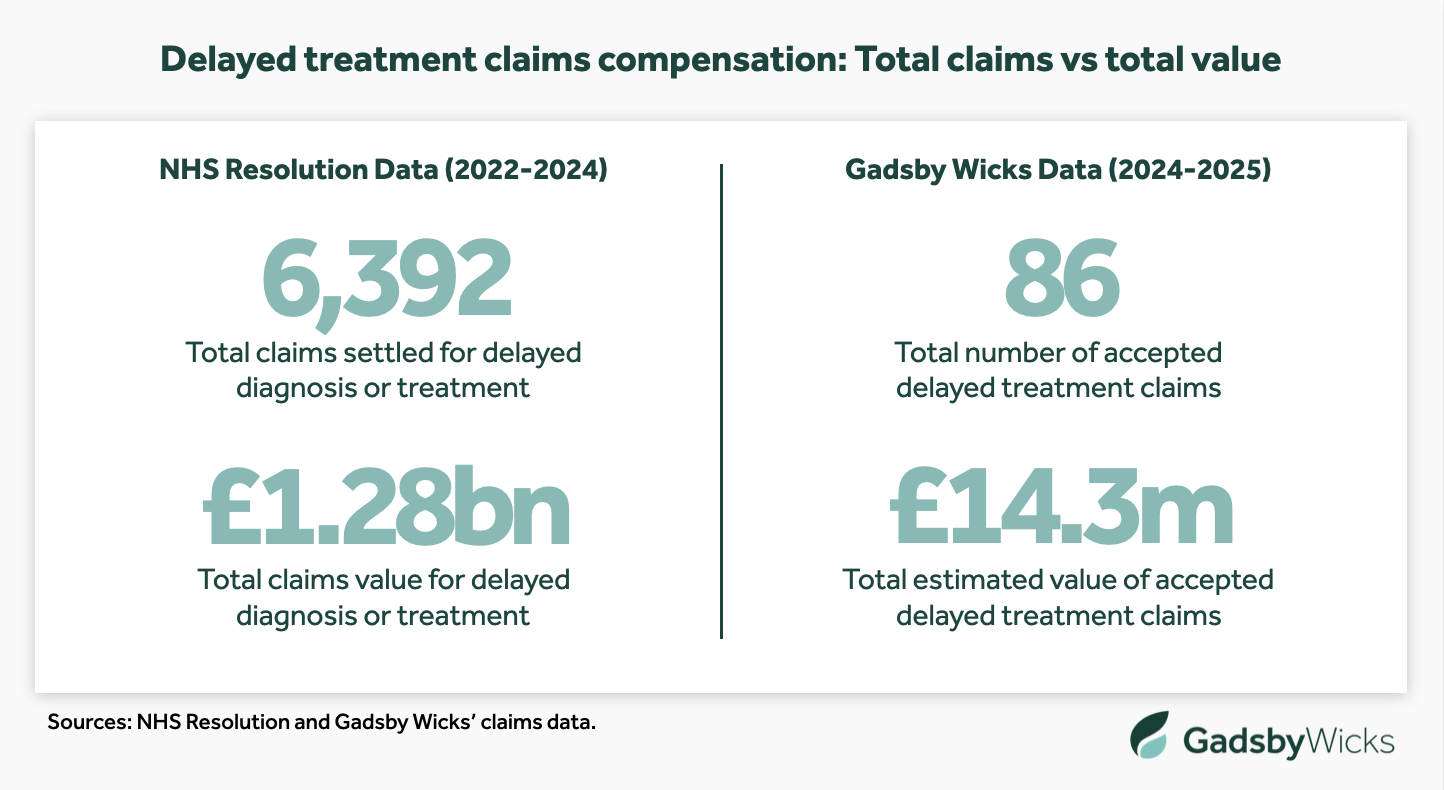
Understanding delayed treatment claims compensation in the UK
According to recent figures from NHS Resolution (2022/2023 and 2023/2024), close to 6,400 delayed treatment claims were settled during this period, for a combined £1.28 billion in damages paid to those affected.
This makes failed or delayed treatment cases among the most common and costly types of clinical negligence claims – a situation that aligns with our own data of delayed treatment claims in Essex and East Anglia.
In 2024/2025, over 35% of our accepted claims at Gadsby Wicks were for delayed treatment – our most common type of claim – while it also accounted for over 27% of estimated case value.
Both NHS Resolution’s national figures and our own local data reveal that delayed treatment claims are frequent compared to other types of claim, and that their overall value closely aligns with the percentage of claims pursued.
However, it is important to note that compensation values for delayed treatment claims can vary significantly. While the majority of claims will resolve for tens or possibly hundreds of thousands of pounds, there are examples of multi-million pound delayed treatment claims across the UK.
View our National and Essex Medical Negligence Statistics post for more information.
Any amount of compensation awarded in a delayed treatment claim should never be viewed as a lottery win. The damages recovered always reflect the pain and suffering a patient endured, and the long-term impact the delay in treatment had on their lives.
At Gadsby Wicks, our solicitors have over 30 years of experience helping people affected by all kinds of delayed treatment. We understand how distressing it can be when care is not provided in time, and we take the time to truly understand what you’ve been through to secure the answers, justice and compensation you deserve.
How is delayed treatment compensation calculated?
When calculating delayed treatment payouts, we focus on two key parts: general damages and special damages.
General damages for delayed treatment claims
General damages refer to the physical and psychological injuries caused by delayed treatment, which is sometimes called “pain, suffering and loss of amenity”.
To calculate general damages, we may initially refer to the Judicial College Guidelines. The JCG provides rough valuations for a wide range of injuries that could result from delayed treatment, including (but not limited to):
- Brain injuries
- Injuries causing paralysis
- Orthopaedic injuries
- Injuries to internal organs
- Chronic pain
- Psychiatric and psychological damage
- Injuries resulting in death
You can review a sample of these values in the table below. Please keep in mind that this is not a complete list due to the scope of potential injuries, and that the JCG only offers approximate figures – delayed treatment compensation must always be calculated on a case-by-case basis.
In addition, unlike most personal injury cases, in medical negligence, the patient will usually be unwell or injured while awaiting treatment. Therefore, we must assess if the patient was expected to return to their pre-injured state in any case, and compare this against the actual outcome.
That is why we recommend seeking advice from solicitors who specialise in delayed treatment claims. We review every case carefully to ensure the compensation reflects the full physical, emotional and practical impact that the delay in care has had on your circumstances.
| Severity | Estimated Value Range | Notes |
|---|---|---|
| Brain injury | ||
| Very severe | £344,150 - £493,000 | Little meaningful response to environment, little language function, double incontinence and full-time nursing care. |
| Moderately severe | £267,340 - £344,150 | Seriously disability, with a substantial dependence on others and a need for constant professional care. |
| Moderate | £52,550 - £267,340 | Moderate to severe intellectual deficit and effects on sight, speech, senses, concentration and memory. |
| Less severe | £18,700 - £52,550 | Similar problems to moderate cases, but will have made a good recovery and will be able to take part in normal social life. |
| Injury involving paralysis | ||
| Tetraplegia / Quadriplegia | £396,140 - £493,000 | Full-body paralysis where the injured person is in no physical pain, but has full awareness of their disability. |
| Paraplegia | £267,340 - £346,890 | Lower-half paralysis, with damages dependent on the extent of pain, degree of independence, life expectancy and more. |
| Amputation of arms | ||
| Loss of both arms | £293,850 - £366,100 | Double-arm amputation that reduces a person with full awareness to a state of considerable helplessness. |
| Loss of one arm | £117,360 - £167,380 | Amputation of a single arm, with values depending on extent of amputation and if it's the person's dominant arm. |
| Bowel injury | ||
| Severe | Up to £224,790 | Cases involving double incontinence – total loss of bowel function and urinary function and control. |
| Moderately severe | Up to £183,190 | Total loss of natural function and dependence on colostomy (depending on age). |
| Moderate | In the region of £97,530 | Persistent faecal urgency and passive incontinence causing embarrassment or distress. |
| Less severe | £54,420 - £85,100 | Severe abdominal injury often necessitating temporary colostomy and/or restriction on diet and employment. |
| Bladder injury | ||
| Severe | Up to £224,790 | Cases involving double incontinence – total loss of bowel function and urinary function and control. |
| Moderately severe | Up to £171,680 | Complete loss of function and control. |
| Moderate | £78,080 - £97,540 | Serious impairment of control with some pain and incontinence. |
| Less severe | £28,570 - £38,210 | Where there has been almost a complete recovery but some fairly long-term interference with natural function. |
| Digestive system injury | ||
| Severe | £46,900 - £64,070 | Severe toxicosis causing serious acute pain, vomiting, diarrhoea and fever, requiring hospital admission. |
| Serious | £11,640 - £23,430 | Serious but short-lived food poisoning, diarrhoea and vomiting diminishing over two to four weeks. |
| Moderate | £4,820 - £11,640 | Food poisoning or allergic reaction causing discomfort, stomach cramps, alteration of bowel function and fatigue. |
| Female reproductive system injury | ||
| Very severe | £140,210 - £207,260 | Infertility with sexual dysfunction, severe depression and anxiety, pain and scarring. |
| Severe | £52,490 - £124,620 | Likely permanent sexual dysfunction in the case of a person with children or who is unable to have children. |
| Moderately severe | £68,440 - £87,070 | Infertility with no aggravating features and no sexual dysfunction in a young person without children. |
| Moderate | £21,920 - £44,840 | Infertility without medical complications and no sexual dysfunction where the injured person already has children. |
| Kidney injury | ||
| Severe | £206,730 - £256,780 | Serious and permanent damage to or loss of both kidneys. |
| Serious | Up to £78,080 | Where there is significant risk of future urinary tract infection or other total loss of natural kidney function. |
| Moderate | £37,550 - £54,760 | Loss of one kidney with no damage to the other |
| Injuries affecting sight | ||
| Most severe | In the region of £493,000 | Total blindness and deafness. |
| Very severe | In the region of £327,940 | Total blindness. |
| Severe | £78,040 - £219,400 | Loss of sight in one eye with reduced vision in the remaining eye, depending on extent of vision loss. |
| Moderately severe | £66,920 - £80,210 | Total loss of one eye, depending on age, psychiatric consequences and cosmetic effect. |
| Moderate | £60,130 - £66,920 | Complete loss of sight in one eye, taking account of some risk of sympathetic ophthalmia. |
| Deafness or tinnitus | ||
| Very severe | £133,810 - £171,680 | Total deafness and loss of speech, often due to deafness occurring at an early age. |
| Severe | £110,750 - £133,810 | Total deafness, with award depending on occurrence of speech deficit or tinnitus. |
| Moderately severe | £38,210 - £55,570 | Total loss of hearing in one ear, with award depending on level of tinnitus, dizziness or headaches. |
| Moderate | £8,560 - £55,570 | Partial hearing loss and/or tinnitus. |
| Impairment of taste/smell | ||
| Severe | In the region of £47,810 | Total loss of taste and smell. |
| Moderately severe | £40,150 - £47,810 | Total loss of smell and significant loss of taste. |
| Moderate | £30,500 - £40,150 | Loss of smell only. |
| Serious | £23, 430 - £30,500 | Loss of taste only. |
| Chronic pain disorders | ||
| Severe | £51,410 - £76,870 | Significant, ongoing symptoms despite treatment, adversely impacting ability to work and requiring care/assistance. |
| Moderate | £25,710 - £46,970 | Symptoms are ongoing, albeit to a lesser degree than the above and a less marked difference on daily life. |
Special damages for delayed treatment claims
Special damages cover the financial impact of a delay in treatment – both those already incurred and future expenses. Examples of special damages may include:
- Medical and rehabilitation costs, including future treatment, specialist consultations, medication and therapy needed because of the delay in care
- Equipment, accommodation and transport, such as medical aids, home adaptations or specially modified vehicles
- Care and support expenses, covering professional care or any additional help needed with day-to-day activities
- Loss of earnings, compensating for income lost during your recovery and any ongoing impact on your ability to work
- Travel expenses, including trips to hospitals, clinics and specialist appointments related to your treatment
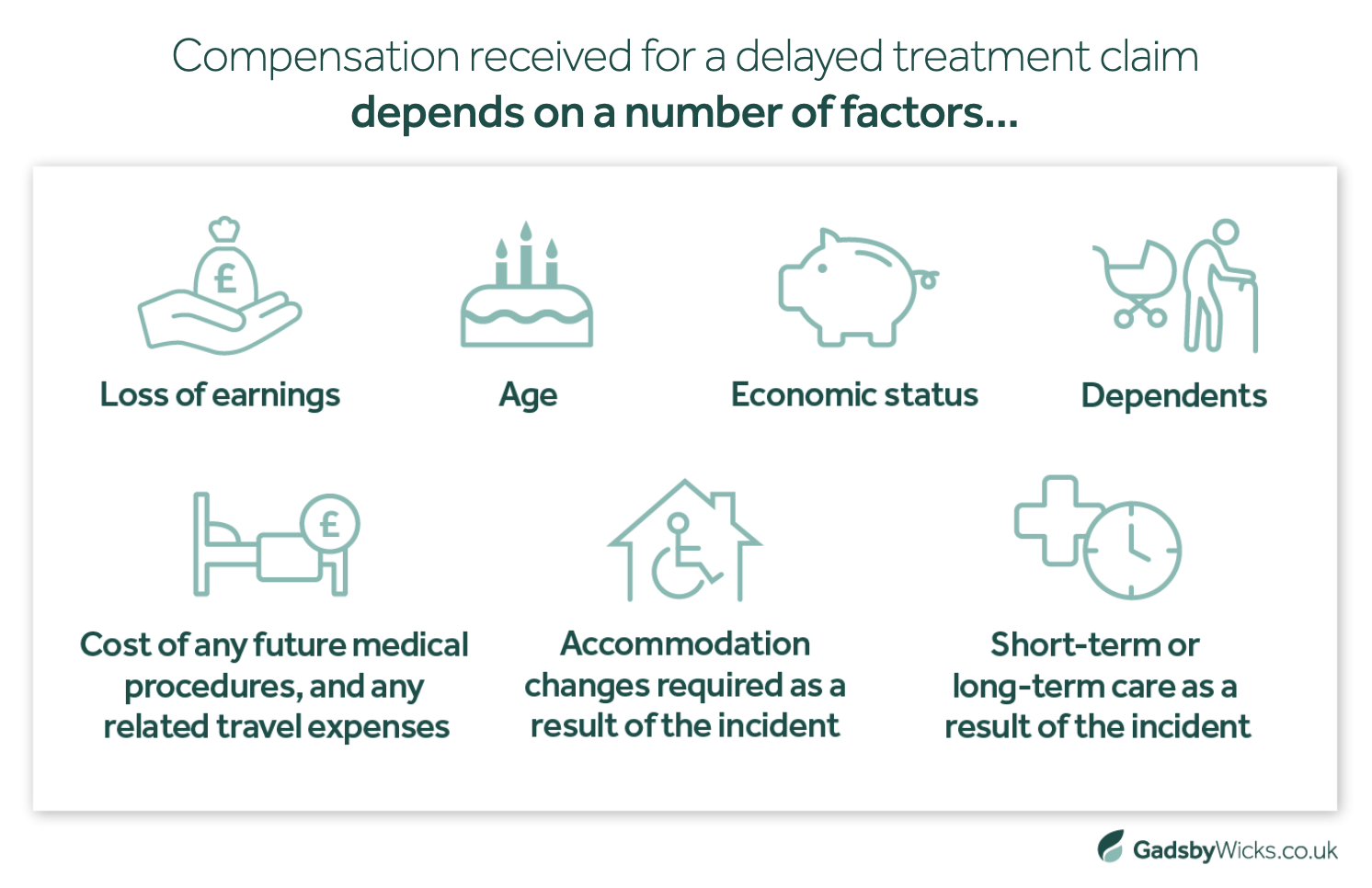
Special damages are largely determined by each person’s unique circumstances and long-term care needs, which is why the amount of compensation for delayed treatment claims can vary significantly.
For example, if delayed treatment of a wrist fracture causes paralysis or chronic, lifelong pain, the special damages awarded to someone who uses their wrist often – such as a builder, artist or hairdresser – will likely be greater due to the impact on their specific earning potential.
As specialist delayed treatment solicitors in Essex, we work closely with medical experts, case managers and forensic accountants to assess the full financial impact of every claim, ensuring that the special damages reflect our clients’ individual needs and long-term wellbeing.
What is the average delayed treatment claim settlement in Essex?
We are often asked what the average value of a delayed treatment claim is. But, in reality, there is no “average” delayed treatment claim settlement.
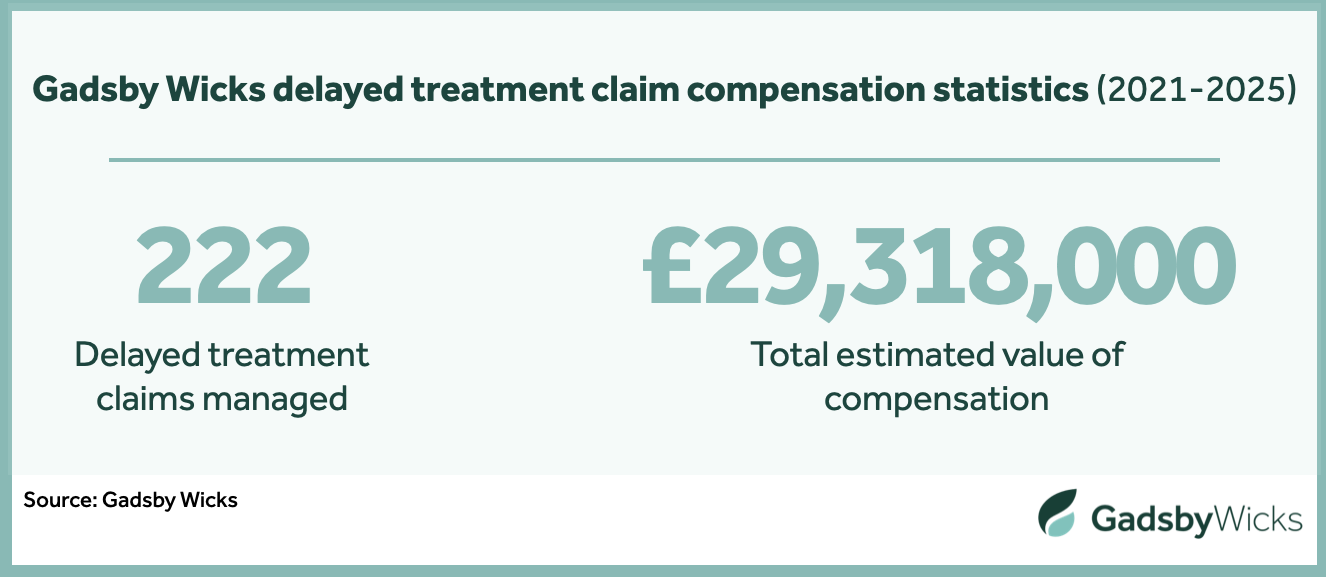
Every claim is unique. Even cases that seem similar can have very different circumstances and outcomes, which is why an average figure rarely reflects the value of an individual claim.
Every delayed treatment claim is unique. We listen, understand what you’ve been through and build a case that truly reflects your needs. With decades of experience in medical negligence, we’re committed to securing the compensation that helps you move forward with confidence.
Should I use a delayed treatment compensation calculator?
Many law firms promote online delayed treatment compensation calculators that promise instant estimates of what your claim might be worth – but these tools can often be misleading.
In reality, most calculators are designed to capture enquiries rather than offer meaningful legal guidance. With decades of experience supporting clients across Essex and East Anglia, we know that no delayed treatment claim can be valued accurately without first understanding your situation and examining the evidence in detail.
At Gadsby Wicks, we believe in absolute honesty and transparency. Every client’s experience is different, so we take the time to understand exactly how the delay in treatment has affected you, so we can provide clear, realistic advice about the compensation you may be entitled to.
Examples of delayed treatment claim compensation amounts
Here are a few examples of settlements we’ve secured for clients in delayed treatment cases across Essex and East Anglia:
- £190,000 for a delayed diagnosis of lung cancer, which sadly led to our client’s premature death
- £150,000 after a man tragically died after several delays stopped him from receiving urgent repair to his abdominal aortic aneurysm
- £95,000 for a woman who lost all vision in her left eye due to delayed diagnosis and treatment of giant cell arteritis and polymyalgia rheumatica
- £62,500 after a lack of urgent action resulted in our client’s fatal heart attack
- £40,000 for the delayed treatment of our client’s wrist fracture, resulting in prolonged pain and the need for additional surgeries
- £25,000 for a delayed diagnosis and treatment of spinal stenosis that extended the wait for corrective surgery
Case studies for some of our delayed treatment claims
What does our delayed treatment claims process look like?

A free initial consultation
Call us, request a callback or complete our online form and we’ll assess if you have a valid medical negligence claim.

Funding your claim
Discover the ways we can fund your claim without you paying a penny at any stage of the process.

Investigating evidence
We gather medical records, witness statements and more to learn what happened to you and prove your claim.

Instructing independent medical experts
We work with impartial, experienced medical experts to establish whether your injuries were due to substandard medical care.

Valuing your claim
We assess your health and financial losses to accurately estimate how much compensation your claim is worth.

Presenting your case
We contact the Defendants and the Courts on your behalf to set out your allegations and receive a response.

Negotiating a settlement
We work to achieve a fair settlement for you outside the courtroom – this is how 96% of our cases end.

Preparing for Trial
If we must proceed to Trial, we fully prepare you for what to expect so you receive the right result in court.
FAQs about delayed treatment claims
What is the definition of delayed treatment?
Delayed treatment is when someone waits longer for a medical misdiagnosis or treatment, whether that is due to hospital waiting times, GP negligence or setbacks in usual processes.
For delayed treatment to be considered negligent:
- The delay must be due to a healthcare professional breaching their duty of care
- The delay must be significant
- The delay must have directly caused the claimant’s injuries
If delayed treatment is due to mistakes by a healthcare professional – mistakes that no reasonable professional in their position would have made – this is a breach of their duty of care.
A significant delay in treatment means there has been a change in the patient’s condition, prognosis or treatment options. If none of these changes, the delay is not considered significant, and there is no claim.
For example, if a doctor fails to diagnose a patient’s lung cancer, but it is identified the following week, it is unlikely the patient’s prognosis will have changed significantly. However, if the delay extends to several months, then it is more likely that there has been a noticeable change, and the person affected has a compensation claim.
When does a delay in treatment become significant?
The time it takes for delayed treatment to become significant depends on the type of illness or injury the patient has.
For slow-moving diseases such as many types of cancer, it may take months for the delay in diagnosis or treatment to have an impact.
However, our solicitors have represented claims where the delay becomes significant much sooner, such as a case where our client tragically died just over a week after his coronary heart disease was initially misdiagnosed.
When is medical negligence to blame for delayed treatment?
For delayed treatment to be considered negligent, you must prove that a healthcare professional breached their duty of care towards a claimant, and that the claimant’s condition, prognosis or treatment options changed as a result.
There are circumstances where delayed treatment is justifiable, even if a patient’s condition worsens. This includes cases of differential diagnoses, where there are multiple different causes for a patient’s ill health.
Imagine that following diagnosis, a patient is deemed to have one of three conditions:
- A fast-moving, potentially fatal disease
- A progressive condition
- A benign condition that does not require treatment
A healthcare professional will prioritise the first option, as it presents the most immediate risk. Should further tests rule this out, they would then proceed to the next possible condition.
In this scenario, if the patient did have the second condition, it may have progressed while the testing was conducted for the first condition. However, if a healthcare professional had a solid rationale to delay this treatment, there are no grounds for a claim.
However, if a healthcare professional started treating the second condition, when in fact the patient was suffering from the first condition, this could be considered negligent as they did not prioritise their diagnoses correctly.
Working with an experienced delayed treatment claims solicitor, such as our experts at Gadsby Wicks, ensures that any negligence you suffered is found and proven, so you recover the compensation you deserve.
View our National and Essex Medical Negligence Statistics post for more industry insight.

Where do I start with a delayed treatment claim?
Start your claim by speaking to experienced delayed treatment claims solicitors, such as our team at Gadsby Wicks.
We are regarded as one of the best medical negligence firms in the UK and will always be transparent with you about the claims process, where you are assigned one dedicated lawyer to manage your case from start to finish.
We thoroughly investigate all available evidence to support your claim, including:
- Witness statements
- Medical records
- Complaint correspondence
- Financial evidence
- Independent medical opinion
- Photographs
We will contact relevant, impartial medical professionals to determine whether the delay to your medical treatment was unreasonable and negligent, and what impact this delay had on your treatment options and prognosis.
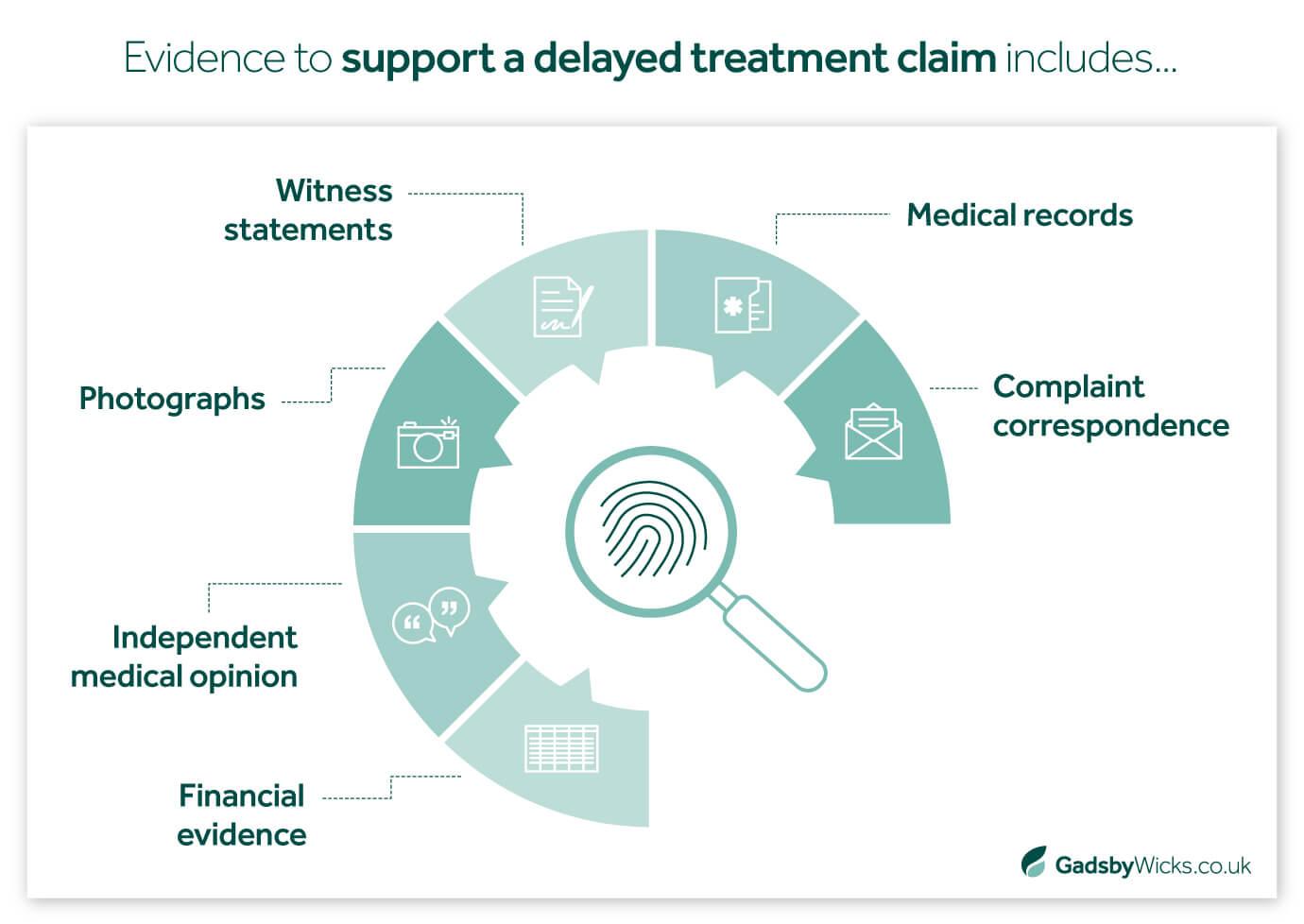
Our investigation may conclude that a delay was justifiable, or that it had no effect on the treatment you received or your long-term prognosis. We are always honest with our clients, even if that means informing them that we believe they do not have a viable claim.
However, if our experts confirm that a healthcare professional breached their duty of care to you and this changed your treatment options and/or prognosis, we work hard to ensure that you are fully compensated. This may include instances related to Sepsis Claims, Cancer Claims or Brain Injury Claims caused or worsened by delays.
If you believe you or a loved one has been affected by delayed treatment, speaking to experienced delayed treatment claims solicitors, such as our team at Gadsby Wicks, will ensure you receive the guidance you need to secure the justice and compensation you deserve.
How can I fund my delayed treatment compensation claim?
At Gadsby Wicks, we offer multiple routes to fund your claim.
Most often, our clients use a ‘no win, no fee‘ agreement, which guarantees that you will not pay anything if your claim is unsuccessful. Our payment is recovered from the compensation you receive.
Alternatively, you may qualify for the Legal Aid Scheme, or have access to legal expenses insurance.
How long do delayed treatment negligence claims take to settle?
We would advise that you should expect a delayed treatment claim to take anywhere between two and five years to reach a final settlement.
This will vary depending on the stance taken by the Defendants, and how long it takes medical experts to determine an accurate prognosis.
Contact our expert delayed treatment claims solicitors
If you or a loved one believe you have been affected by a negligent delay in treatment, and would like to speak to someone about your options, our team is here to listen and advise you on your next steps.

Lexcel accredited medical negligence claims solicitors
We are proud to be a Lexcel-accredited practice. The accreditation is a mark of quality and comes directly from the Law Society.
A recent assessment described us as a “Centre of Excellence” and we continue to operate to the highest standards across all main areas of our field. These include client care, case management, financial management, structure and strategy, people management, risk management, information management and file management.









